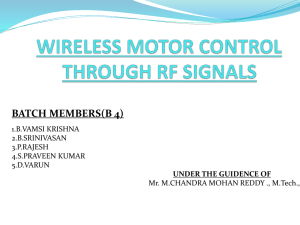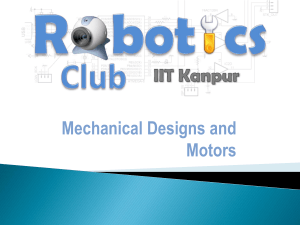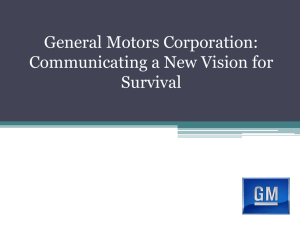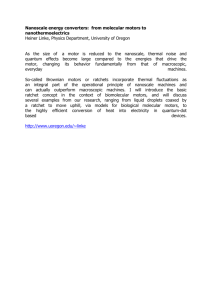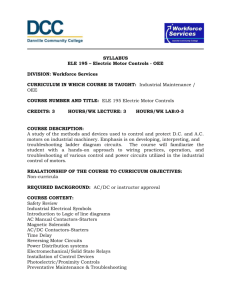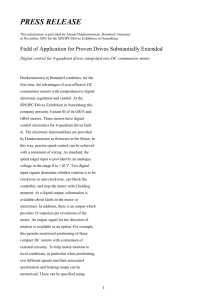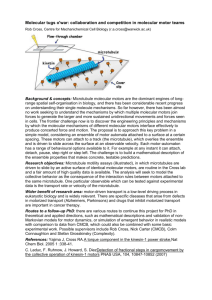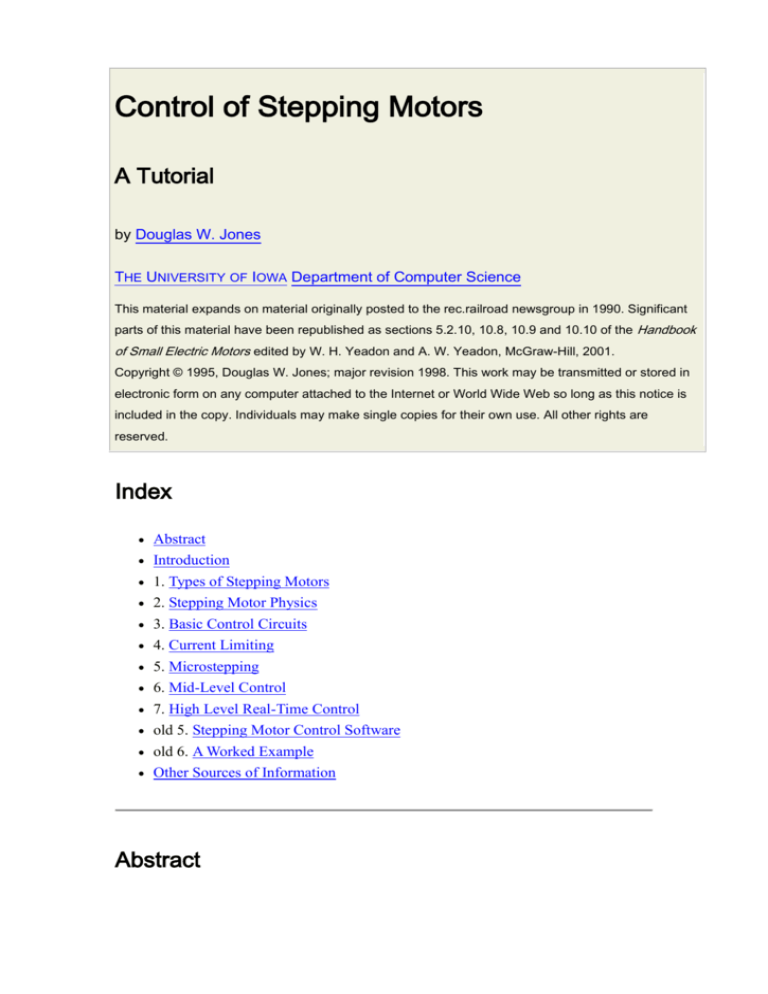
Control of Stepping Motors
A Tutorial
by Douglas W. Jones
THE UNIVERSITY OF IOWA Department of Computer Science
This material expands on material originally posted to the rec.railroad newsgroup in 1990. Significant
parts of this material have been republished as sections 5.2.10, 10.8, 10.9 and 10.10 of the Handbook
of Small Electric Motors edited by W. H. Yeadon and A. W. Yeadon, McGraw-Hill, 2001.
Copyright © 1995, Douglas W. Jones; major revision 1998. This work may be transmitted or stored in
electronic form on any computer attached to the Internet or World Wide Web so long as this notice is
included in the copy. Individuals may make single copies for their own use. All other rights are
reserved.
Index
Abstract
Introduction
1. Types of Stepping Motors
2. Stepping Motor Physics
3. Basic Control Circuits
4. Current Limiting
5. Microstepping
6. Mid-Level Control
7. High Level Real-Time Control
old 5. Stepping Motor Control Software
old 6. A Worked Example
Other Sources of Information
Abstract
This tutorial covers the basic principles of stepping motors and stepping motor
control systems, including both the physics of steppers, the electronics of the
basic control systems, and software architectures appropriate for motor
control.
Introduction
Stepping motors can be viewed as electric motors without commutators.
Typically, all windings in the motor are part of the stator, and the rotor is either
a permanent magnet or, in the case of variable reluctance motors, a toothed
block of some magnetically soft material. All of the commutation must be
handled externally by the motor controller, and typically, the motors and
controllers are designed so that the motor may be held in any fixed position as
well as being rotated one way or the other. Most steppers, as they are also
known, can be stepped at audio frequencies, allowing them to spin quite
quickly, and with an appropriate controller, they may be started and stopped
"on a dime" at controlled orientations.
For some applications, there is a choice between using servomotors and
stepping motors. Both types of motors offer similar opportunities for precise
positioning, but they differ in a number of ways. Servomotors require analog
feedback control systems of some type. Typically, this involves a potentiometer
to provide feedback about the rotor position, and some mix of circuitry to drive
a current through the motor inversely proportional to the difference between
the desired position and the current position.
In making a choice between steppers and servos, a number of issues must be
considered; which of these will matter depends on the application. For example,
the repeatability of positioning done with a stepping motor depends on the
geometry of the motor rotor, while the repeatability of positioning done with a
servomotor generally depends on the stability of the potentiometer and other
analog components in the feedback circuit.
Stepping motors can be used in simple open-loop control systems; these are
generally adequate for systems that operate at low accelerations with static
loads, but closed loop control may be essential for high accelerations,
particularly if they involve variable loads. If a stepper in an open-loop control
system is overtorqued, all knowledge of rotor position is lost and the system
must be reinitialized; servomotors are not subject to this problem.
Stepping motors are known in German as Schrittmotoren, in French as
moteurs pas à pas, and in Spanish as motor paso paso.
Other Sources of Information
Web Sites
Other Motor Control Web Pages
Advanced Micro Systems Stepper Motor Basics
an excellent tutorial from a maker of motors and controllers.
motioncontrol.com
a commercially operated gateway to motion control resources on the web
Ian Harries on Stepping Motors
with a nice set of information on reverse engineering salvaged motors and a
number of example applications.
Euclid Research MotionScope demo
excellent illustrations of physical behavior of some real motors.
Motor Manufacturers
Advanced Micro Systems (1.8 degree per step, large permanent magnet motors)
Astrosyn. (UK)
Donovan Micro-Tek Inc. (very small motors)
Eastern Air Devices Inc. (midsize motors and linear actuators)
MyMotors & Actuators The Faulhaber Group (very small pancake-format
motors)
Gunda Electronic GmbH (German) (Google's English translation)
Haydon Switch and Instrument, Inc.
IntelLiDrives (high-resolution linear and 2-d planar stepping motors)
Lin Engineering (100 to 800 steps per revolution)
MicroMo Electronics (very small motors)
Mitsumi (Japan)
Phytron, Inc. (motors and controllers)
Portescap Inc.
Shinano Kenshi Corp. (SKC)
Micro Precision Systems (remarkably small motors and controllers)
Controllers
Advanced Micro Systems
Astrosyn. (UK)
Advanced Micro Systems Inc.
Alzanti Limited (UK)
Arrick Robotics
Control Technology Corporation
E-Lab Digital Engineering, Inc.
GreenSpring Computers
Simple Step LLC
Netmotion
StepperControl.com
Distributors
ACP&D Limited (UK) (UK version) (distributor for COLIBRI integrated
motor/controllers and maker of COBRA linear and planar stepping motors)
Alzanti Limited (UK)
Electro Sales Inc. (northeast USA)
Flexible Technologies, Inc. (Southwest USA)
MESA Systems Co. (USA) (distributor for COLIBRI integrated
motor/controllers)
Motionex (southeast USA)
Smart Motion Control Inc. dba ABC Motion Control (northeast USA)
Technovation Systems Ltd. (UK)
Surplus and Hobbyist Suppliers
ALL Electronics (new and surplus)
DIY Electronics (kits, Hong Kong)
EIO's Stepper Motor Page (surplus)
PC Gadgets (the Gadgetmaster interface)
Hi-Tech Surplus
Surplus Center (mostly heavy industrial surplus, Nebraska)
Vorlac (Surplus, australia)
Wirz Electronics (Hobbyist oriented, controllers)
Motor Design, Selection and Prototype Fabricaton Services
Yeadon Engineering Services, yes@up.net (Michigan)
YES is the contact for the Small Motor Manufacturer's Association.
Other Web Pages
The Art of Motion Control;
Bruce Shapiro's stepper-controlled machine-shop and artist's studio.
EIO's Stepper Motor Page;
a surplus dealer, but listed here because of their extensive index of information
about stepping motors.
Fractional Horsepower Motor Manufacturers;
an index maintained by Industrial Quick Search.
Schmitz Engineering Liaison;
a rotary shaft position encoder distributor offering consulting services on
encoder use. Roger Schmitz wrote Encoder Output Choices for System
Designers for MOTION Magazine.
Books
Handbook of Small Electric Motors
William H. Yeadon and Alan W, Yeadon, eds.
McGraw-Hill, c2001.
LC number: TK2537 .H34 2001
Stepping motors: a guide to modern theory and practice
Acarnley, P. P.
P. Peregrinus on behalf of the IEE, 1984, c1982.
LC number: TK2537 .A28 1984
A third edition has recently been released.
Stepping motors and their microprocessor controls
Kenjo, Takashi
Oxford University Press, c1984.
LC number: TK2785 .K4 1984
lfu
iserab
m

